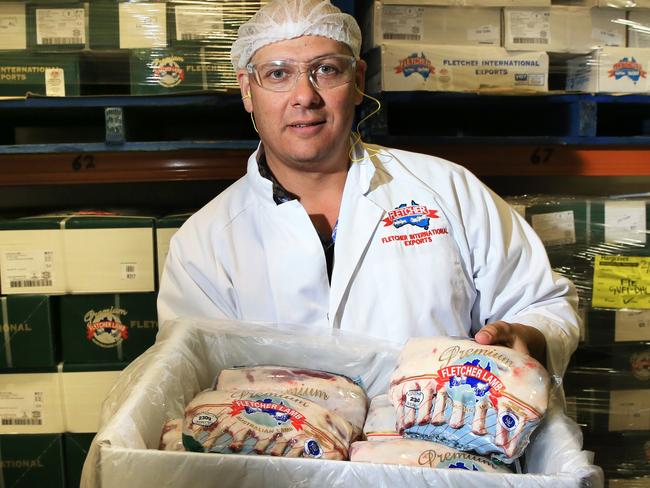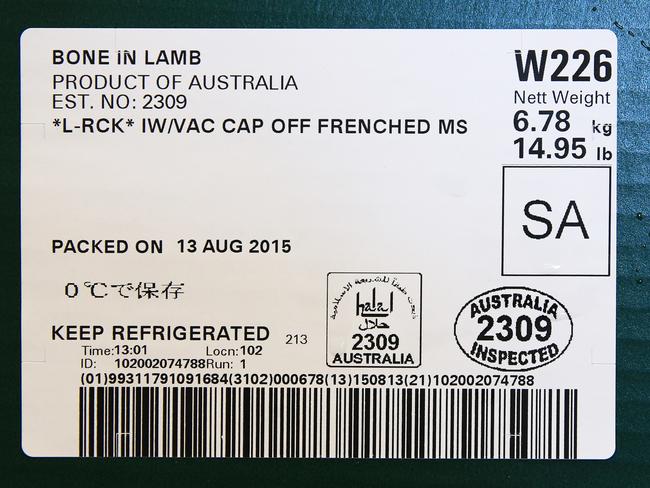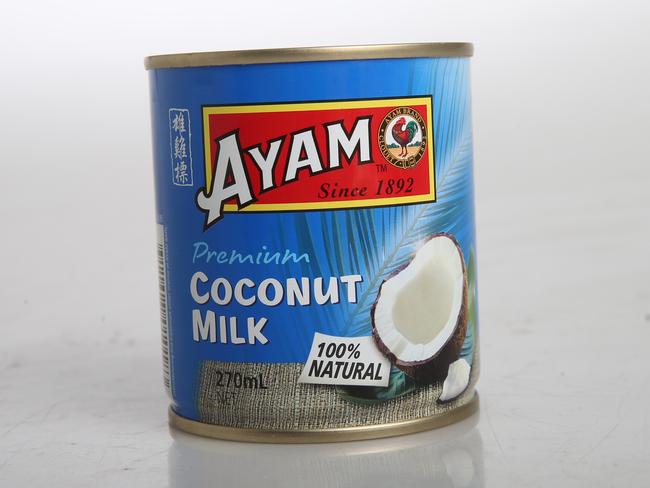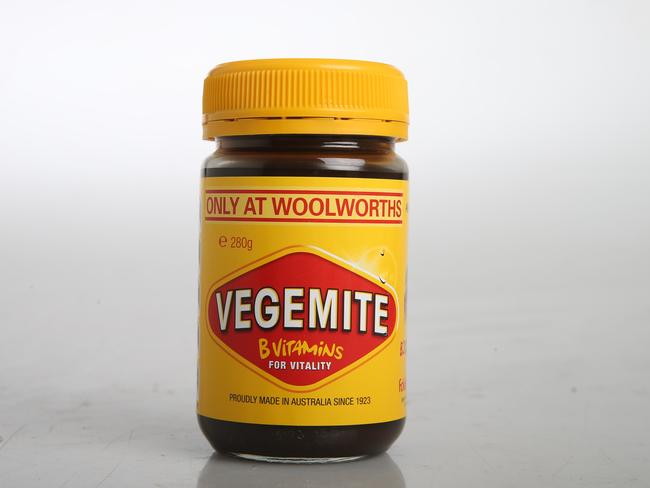Halal Certification in India: A Golden Opportunity
http://www.jamiathalaltrust.org/halal-certification-in-india.php
How Islam Uses Halal Industry To Wage Economic Jihad
Halal certification in Australia is big business and worth millions to certifiers
YOU may not have noticed it — the halal certification on almost every item in an Aussie shopping basket from Vegemite and Cadbury chocolate to Steggles chicken.
NSW
Don't miss out on the headlines from NSW. Followed categories will be added to My News.
YOU may not have noticed it — the halal certification mark that sits on almost every item in an Aussie shopping basket from Vegemite and Cadbury chocolate to Steggles chicken breast tenders.
But it is there and manufacturers, wholesalers and food processors have paid a slew of unregulated certifiers millions of dollars to put it there.
It’s all about money.
The manufacturers want access to the domestic and export markets the certification provides and the certifiers want their cash.
One of the biggest certifiers, the Islamic Federation of Islamic Councils, in the last financial year, had an income of almost $6 million, which added nicely to its $63 million worth of assets.
Farmer Kirralie Smith, founder of the Halal Choices website, argues that manufacturers are passing on the cost of halal certification to Australian consumers.
But just how much each certification cost was unclear and varied from case to case with some abattoirs being charged more than $12,000 annually to be accredited and others more than $25,000.
Ms Smith said in some cases halal products were being certified multiple times — at the processing, wholesaling and retailing stages — which provided a bonanza for certifiers.
“It is just an unregulated mess which needs to have much greater regulation and the profiteering taken out of it,” she said.
Farron Fletcher pictured at his family's abattoir in Dubbo. Fletcher International Exports are a halal certified abattoir for all their exported meats. Picture: Toby Zerna Halal certification means that the product does not contain banned items that Muslims cannot eat, such as pork or alcohol, and has been produced on machines that have been cleansed according to Islamic law.
Foods are not tested in a laboratory, the ingredients are simply analysed and, where appropriate, given the all-important approval.
In the case of live animals, halal certification means they have been killed by a practising Muslim slaughterman with a cut to the throat by a single blade. In Australia the animals are stunned first.
Farron Fletcher has been slaughtering sheep according to Muslim traditions since 1974. Halal sheep exports are worth $2 billion alone. Picture: Toby Zerna The slaughterman gives a blessing, “Bismillahi-Allahu-Akbar (In the name of God, God is the Greatest) before the animal dies.
For chickens, suspended upside down and zipping towards a rotating blade at the rate of 200 a minute, that means a slaughterman stands and runs his hands along the line of birds while reciting the blessing as they flash by.
Even that has upset some traditional Muslims who will only buy birds that have been killed by hand.
“I believe some of the not-for-profit organisations are not quite transparent about where they spend their money” — Halal Australia CEO Muhammad Khan
Roger Fletcher, owner of one of the major sheep processors in Australia, has been slaughtering sheep at his Dubbo abattoir according to Muslim tradition since 1974.
“We are considered the best in the world for the supply of halal meat,” said Mr Fletcher. The reason is tight government regulation that has made Australian meat highly desirable to markets in Europe, Japan, China and America.
Halal sheep exports alone are worth more than $2 billion and create thousands of jobs.
But at home the halal certification market is crowded with businesses and not for profit organisations all vying to get their stamp of approval on a product — in return for a fee.
“There’s no doubt there’s a lack of clarity around what it is, who does it, and why,” Australian Food and Grocery Council CEO Gary Dawson said.
Packaging showing the certified halal lamb. Picture: Toby Zerna Now a senate inquiry has been set up to investigate all food certification such as kosher, organic and the Heart Foundation Tick.
The majority of the 670 submissions posted on line so far — and probably much of the giant backlog still waiting to be processed — are about halal certification.
Mr Dawson, who represents the nation’s major food manufacturers, said: “Given the level of public interest and scrutiny it’s incumbent on the certifiers themselves to improve the transparency.”
Even Australia’s halal certifiers agree there needs to be more clarity about what they do.
Halal Australia CEO Muhammad Khan called for a national halal food standard code that could be regulated by the federal government.
“I believe some of the not-for-profit organisations are not quite transparent about where they spend their money. I think the Government needs to look at this more closely,” he said this week.
Ayam coconut milk is a halal approved product. Picture: DYLAN ROBINSON One of those organisations, the Supreme Islamic Council of Halal Meat in Australia, agreed “that there should always be transparency in an industry such as this”.
“We encourage government to implement a system of regulation domestically around certifiers that will give further confidence to the community,” it said in a letter.
The Council donates its profits to charitable groups and stressed: “We ensure that no money through our organisation ends up in the wrongful hands such as terrorist groups.”
However the world of halal certifiers is riven with rivalries, disputes and in-fighting.
Last year Sydney based Halal Certification Authority boss Mohamed El-Mouelhy was quoted in Tempo magazine as saying that it was common practice for certifiers to pay bribes to Indonesia’s main halal certifying body the Majelis Ulama Indonesia (MUI).
Vegemite is a halal approved product. Picture: DYLAN ROBINSON Mr El-Mouelhy refused to speak to The Daily Telegraph, however the Australian Federal Police confirmed it had investigated the claims and found no evidence of bribery. Meanwhile the outgoing Indonesian government has dismantled the MUI.
While the certifiers scrap between themselves, Australian manufacturers are often caught having to get a halal certification from a string of different certifiers to satisfy the demands of different countries.
Mr Dawson said that put at risk “the $13 billion of Australian agri-food products which are exported to Islamic societies annually.”
It seems everyone agrees that the halal certification world needs to be sorted out — achieving that means the senate inquiry has its work cut out.
Don't miss out on the headlines from NSW. Followed categories will be added to My News.
YOU may not have noticed it — the halal certification mark that sits on almost every item in an Aussie shopping basket from Vegemite and Cadbury chocolate to Steggles chicken breast tenders.
But it is there and manufacturers, wholesalers and food processors have paid a slew of unregulated certifiers millions of dollars to put it there.
It’s all about money.
The manufacturers want access to the domestic and export markets the certification provides and the certifiers want their cash.
One of the biggest certifiers, the Islamic Federation of Islamic Councils, in the last financial year, had an income of almost $6 million, which added nicely to its $63 million worth of assets.
Farmer Kirralie Smith, founder of the Halal Choices website, argues that manufacturers are passing on the cost of halal certification to Australian consumers.
But just how much each certification cost was unclear and varied from case to case with some abattoirs being charged more than $12,000 annually to be accredited and others more than $25,000.
Ms Smith said in some cases halal products were being certified multiple times — at the processing, wholesaling and retailing stages — which provided a bonanza for certifiers.
“It is just an unregulated mess which needs to have much greater regulation and the profiteering taken out of it,” she said.
Halal certification means that the product does not contain banned items that Muslims cannot eat, such as pork or alcohol, and has been produced on machines that have been cleansed according to Islamic law.
Foods are not tested in a laboratory, the ingredients are simply analysed and, where appropriate, given the all-important approval.
In the case of live animals, halal certification means they have been killed by a practising Muslim slaughterman with a cut to the throat by a single blade. In Australia the animals are stunned first.
The slaughterman gives a blessing, “Bismillahi-Allahu-Akbar (In the name of God, God is the Greatest) before the animal dies.
For chickens, suspended upside down and zipping towards a rotating blade at the rate of 200 a minute, that means a slaughterman stands and runs his hands along the line of birds while reciting the blessing as they flash by.
Even that has upset some traditional Muslims who will only buy birds that have been killed by hand.
“I believe some of the not-for-profit organisations are not quite transparent about where they spend their money” — Halal Australia CEO Muhammad Khan
Roger Fletcher, owner of one of the major sheep processors in Australia, has been slaughtering sheep at his Dubbo abattoir according to Muslim tradition since 1974.
“We are considered the best in the world for the supply of halal meat,” said Mr Fletcher. The reason is tight government regulation that has made Australian meat highly desirable to markets in Europe, Japan, China and America.
Halal sheep exports alone are worth more than $2 billion and create thousands of jobs.
But at home the halal certification market is crowded with businesses and not for profit organisations all vying to get their stamp of approval on a product — in return for a fee.
“There’s no doubt there’s a lack of clarity around what it is, who does it, and why,” Australian Food and Grocery Council CEO Gary Dawson said.
Now a senate inquiry has been set up to investigate all food certification such as kosher, organic and the Heart Foundation Tick.
The majority of the 670 submissions posted on line so far — and probably much of the giant backlog still waiting to be processed — are about halal certification.
Mr Dawson, who represents the nation’s major food manufacturers, said: “Given the level of public interest and scrutiny it’s incumbent on the certifiers themselves to improve the transparency.”
Even Australia’s halal certifiers agree there needs to be more clarity about what they do.
Halal Australia CEO Muhammad Khan called for a national halal food standard code that could be regulated by the federal government.
“I believe some of the not-for-profit organisations are not quite transparent about where they spend their money. I think the Government needs to look at this more closely,” he said this week.
One of those organisations, the Supreme Islamic Council of Halal Meat in Australia, agreed “that there should always be transparency in an industry such as this”.
“We encourage government to implement a system of regulation domestically around certifiers that will give further confidence to the community,” it said in a letter.
The Council donates its profits to charitable groups and stressed: “We ensure that no money through our organisation ends up in the wrongful hands such as terrorist groups.”
However the world of halal certifiers is riven with rivalries, disputes and in-fighting.
Last year Sydney based Halal Certification Authority boss Mohamed El-Mouelhy was quoted in Tempo magazine as saying that it was common practice for certifiers to pay bribes to Indonesia’s main halal certifying body the Majelis Ulama Indonesia (MUI).
Mr El-Mouelhy refused to speak to The Daily Telegraph, however the Australian Federal Police confirmed it had investigated the claims and found no evidence of bribery. Meanwhile the outgoing Indonesian government has dismantled the MUI.
While the certifiers scrap between themselves, Australian manufacturers are often caught having to get a halal certification from a string of different certifiers to satisfy the demands of different countries.
Mr Dawson said that put at risk “the $13 billion of Australian agri-food products which are exported to Islamic societies annually.”
It seems everyone agrees that the halal certification world needs to be sorted out — achieving that means the senate inquiry has its work cut out.






